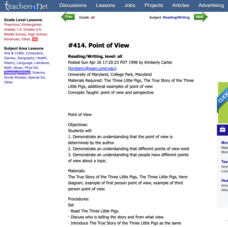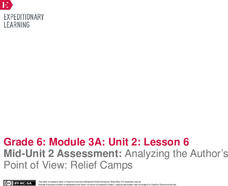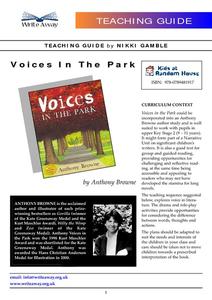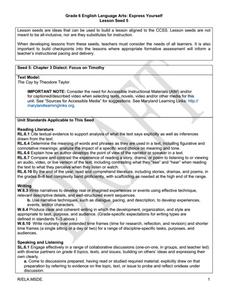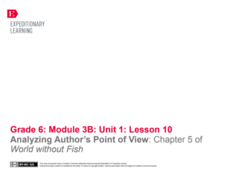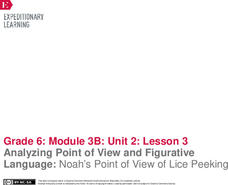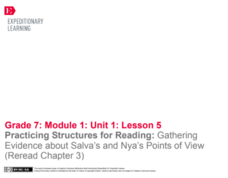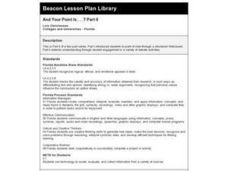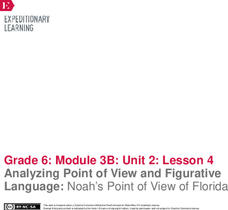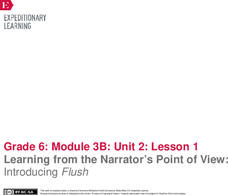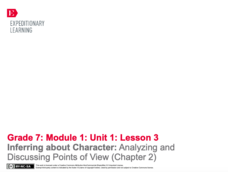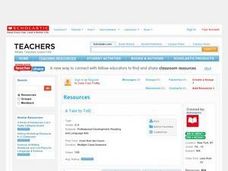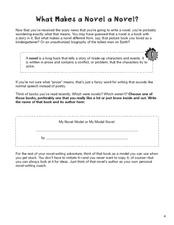K12 Reader
Narrator’s Point of View Flow Chart
How can you tell what point of view a narrator is using, and why does it matter when reading or writing? Use a handy flow chart to determine whether or not your narrator is telling the story from a first or third person point of view.
Teachers.net
Point of View
Work with your class on point of view by reading "The Three Little Pigs." Learners demonstrate an understanding that the point of view is determined by the author and that different points of view exist. They then read a different short...
Curated OER
Author's Purpose
Sixth graders brainstorm the reasons authors write, and they list their responses on the board. Students discuss each purpose they have listed.Students work independently to read the selection "Tarantulas and Typhoid" by Stephanie Moss....
Curated OER
Gingerbread Baby's Point of View #8
Read the story Gingerbread Baby and use these various activities to connect to grammar, art, and point of view. In one activity, learners create character masks. They practice writing verbs on the back of the masks to tell what each...
EngageNY
Mid-Unit 2 Assessment: Analyzing the Author’s Point of View: Relief Camps
We're halfway there ... what a relief! Scholars read an excerpt from a primary source about the relief camps associated with the1906 San Francisco earthquake. Next, they complete a mid-unit assessment, answering short-answer and...
EngageNY
Reading for Gist and Analyzing Point of View: Moon Shadow
Character analysis isn't always earth-shattering. Using a graphic organizer, pupils analyze Moon Shadow's point of view following the earthquake in Laurence Yep's Dragonwings. Also, scholars co-create an anchor chart showing the...
Library of Congress
Determining Point of View: Paul Revere and the Boston Massacre
If you're teaching point of view, this is the lesson for you! First, decipher the writer's point of view from a primary resource, then compare and contrast the primary source with a secondary source to explore the Paul Revere's engraving...
Write Away!
Voices In the Park
Explore the impact a narrator's point of view has on a story with a reading of the children's book, Voices in the Park by Anthony Browne. Written in four different voices, the story is told and retold from different perspectives to...
Santa Ana Unified School District
The Power of Point of View
Sometimes a whole story can change based on the perspective of the person telling it. Practice identifying and analyzing point of view in various reading passages and writing assignments with a language arts packet, complete with Common...
Curated OER
Express Yourself Lesson Seed 5
Building on the previous activity in this series of lesson seeds, this plan focuses on the use of dialect in Theodore Taylor's novel, The Cay. Class members examine specific lines of text, use their reading journals to respond to the...
Maryland Department of Education
The Concept of Diversity in World Literature Lesson 12: Author's Purpose - Yeats and Achebe
Is there such a thing as fate/luck? Can one fight destiny? As part of their study of Chinua Achebe's purpose in writing Things Fall Apart, class members answer these questions from Achebe's point of view and then from William Butler...
Concord Consortium
Intermolecular Attractions and Boiling Point
Why do different substances have different boiling points? Through an interactive lesson, learners explore how intermolecular attractions affect boiling points. They interact with molecules through an animation and make conclusions about...
Curated OER
Hawthorne: Author and Narrator
Learners examine the difference between a narrator and author. They read Nathaniel Hawthorne's novel, 'The Scarlet Letter,' write a description of the narrator, and research how Hawthorne was impacted by the politics of the time.
EngageNY
Analyzing Author’s Point of View: Chapter 5 of World without Fish
That's an interesting perspective. Scholars read chapter five of World without Fish and use an Author’s Point of View graphic organizer to determine the author's perspective. In triads, they highlight words that support the author's...
EngageNY
Analyzing Point of View and Figurative Language: Noah’s Point of View of Lice Peeking
Read along with me. Two learners read the parts of Noah and Lice in Flush as the rest of the class follows along. Readers look for unfamiliar words and the use of figurative language in the text. They complete graphic organizers and...
EngageNY
Practicing Structures for Reading: Gathering Evidence about Salva’s and Nya’s Points of View (Reread Chapter 3)
How does an author develop and contrast character points of view in a work of literature? Using a graphic organizer, readers continue gathering evidence about character point of view from Linda Sue Park's A Long Walk to Water. Next,...
Curated OER
And Your Point Is . . .? Part II
After researching recent community or political issues, paired with a review of proper debate format, class members select a topic, adopt a side, and prepare for a debate. The value in this resource is the review of debate procedures,...
EngageNY
Analyzing Point of View and Figurative Language: Noah’s Point of View of Florida
Fishing for words. Scholars search for unfamiliar words in pages 27-29 of Flush, place them in their word catchers, and complete part of Noah’s Point of View graphic organizer. After identifying figurative language, learners analyze tone...
EngageNY
Learning from the Narrator’s Point of View: Introducing Flush
It is all down the drain. Scholars read chapter one of Flush and write any unfamiliar words in their word catchers and identify the narrator and point of view of the story. Pupils complete a point of view anchor chart and use Thought,...
EngageNY
Inferring about Character: Analyzing and Discussing Points of View (Chapter 2)
Readers engage in discussion with partners to answer questions about A Long Walk to Water by Linda Sue Park. Next, they complete exit tickets, writing about how the author creates different points of view for her characters.
EngageNY
Analyzing the Author’s Perspective: “Equal Rights for Women” by Shirley Chisholm
It's all about perspective. Scholars talk about the meaning of perspective and look closely at the point of view of Equal Rights for Women. They discuss how Chisholm addresses the views of others and complete a close reading guide to...
K20 LEARN
The New Colossus: Determining Author's Perspective
Introduce young scholars to the concept of the author's perspective with a lesson that uses Emma Lazarus's poem, "The New Colossus," as the anchor text. Groups use a T-chart to identify words that reveal the author's point of view of The...
Scholastic
A Tale to Tell!
A creative spin occurs when one pupil acts as author Ann M. Martin. Using a Q & A at the back of her book A Dog's Life, other classmates ask the "author" questions. They discuss the reasons why they know the book is from a...
Curated OER
What Makes a Novel a Novel?
As your authors prepare to write a hypothetical novel, they need all the inspiration they can find! Using a book they have already read (and enjoyed), learners complete a literary analysis by filling in eight short-answer questions....
Other popular searches
- Authors Point of View
- Author's Point of View
- Author's Point of View Media
- Authors Point of View Media
- Author's "Point of View" Media



